Battle of Rumaila
| Battle of Rumaila | |||||||
|---|---|---|---|---|---|---|---|
| Part of the Gulf War (aftermath) | |||||||
 Armored vehicles captured in the Euphrates Valley of Iraq presented to the United States Army Infantry School by the 24th Infantry Division (Mechanized) in 1991 |
|||||||
|
|||||||
| Belligerents | |||||||
|
|
|
||||||
| Commanders and leaders | |||||||
| Gen. Norman Schwarzkopf, Jr. Gen. Frederick M. Franks, Jr. Barry McCaffrey |
General Ayad Futayih al-Rawi | ||||||
| Units involved | |||||||
|
24th Infantry Division 1st Battalion, 24th Aviation Regiment |
Republican Guard 1st Hammurabi Armored Division | ||||||
| Strength | |||||||
| 25,000 troops 241 M1 Abrams tanks 221 M2 Bradley Armored fighting vehicles 94 helicopters |
Estimated 7,000 | ||||||
| Casualties and losses | |||||||
| 1 wounded 1 tank 1 AFV |
Likely 700 or more killed Many wounded/captured 187 armored vehicles 400+ trucks 33-43 artillery pieces 8 BM-21 Grad multiple rocket launchers 4 helicopters |
||||||
|
|
|||||||
The Battle of Rumaila, also known as the Battle of the Causeway or the Battle of the Junkyard, was a controversial engagement that took place on March 2, 1991, near the Rumaila oil field in the Euphrates Valley of southern Iraq, when the U.S. Army forces, mostly the 24th Infantry Division under Lt. Gen. Barry McCaffrey engaged and nearly annihilated a large column of withdrawing Iraqi Republican Guard armored forces during the immediate aftermath of the Gulf War.
On 26 February, the 24th Infantry Division advanced through the valley and captured Iraqi airfields at Jabbah and Tallil. At the airfields, it encountered entrenched resistance from the Iraqi 37th and 49th Infantry Divisions, as well as the 6th Nebuchadnezzar Mechanized Division of the Iraqi Republican Guard. Despite some of the most fierce resistance of the war, the 24th Infantry Division destroyed the Iraqi formations and captured the two airfields the next day. The 24th then moved east with VII Corps and engaged several Iraqi Republican Guard divisions. The 24th Infantry Division's Task Force Tusker attacked entrenched Iraqi forces on 26 February 1991 to seize battle position 143, effectively severing the Iraqi Euphrates River Valley line of communication to the Kuwait Theater of operation and destroying the major combat elements of the Iraqi Republican Guard Forces Command's elite 26th Commando Brigade.
Iraqi Republican Guard forces were engaged within the Hammar Marshes of the Tigris–Euphrates river system in Iraq while attempting to reach and cross the Lake Hammar causeway and escape northward toward Baghdad. Most of the five-mile-long Iraqi caravan of several hundred vehicles was first boxed into a kill zone and then in the course of the next five hours systematically devastated by the U.S. 24th Infantry Division, including its armored forces, by AH-64 Apache attack helicopters, and five artillery battalions.
...
Wikipedia

